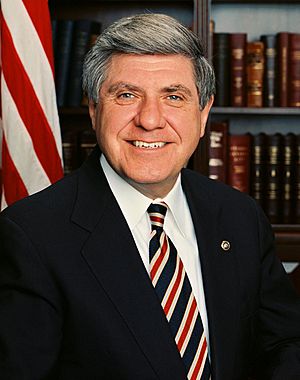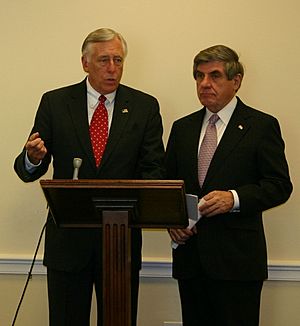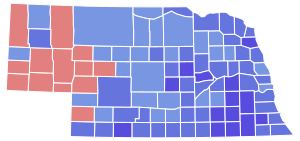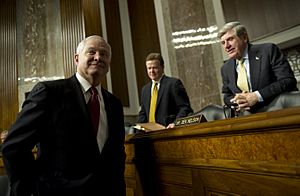Ben Nelson facts for kids
Quick facts for kids
Ben Nelson
|
|
|---|---|
 |
|
| United States Senator from Nebraska |
|
| In office January 3, 2001 – January 3, 2013 |
|
| Preceded by | Bob Kerrey |
| Succeeded by | Deb Fischer |
| 37th Governor of Nebraska | |
| In office January 9, 1991 – January 7, 1999 |
|
| Lieutenant | Maxine Moul Kim Robak |
| Preceded by | Kay Orr |
| Succeeded by | Mike Johanns |
| Director of the Nebraska Department of Insurance | |
| In office 1975–1976 |
|
| Governor | J. James Exon |
| Preceded by | James M. Jackson |
| Succeeded by | Berri Balka |
| Personal details | |
| Born |
Earl Benjamin Nelson
May 17, 1941 McCook, Nebraska, U.S. |
| Political party | Democratic |
| Spouse | Diane Nelson |
| Education | University of Nebraska–Lincoln (BA, MA, JD) |
Earl Benjamin "Ben" Nelson (born May 17, 1941) is an American lawyer and politician. He served as the 37th governor of Nebraska from 1991 to 1999. Later, he was a United States Senator for Nebraska from 2001 to 2013.
Nelson is a member of the Democratic Party. He is the last Democrat to have won an election for a statewide office in Nebraska. Before he entered politics, Nelson worked as an executive in the insurance industry.
In the Senate, Nelson was known as one of the most conservative Democrats. This means he often voted differently from most other members of his party.
Contents
Early Life and Education
Earl Benjamin Nelson was born in McCook, Nebraska, on May 17, 1941. He was the only child of Birdella and Benjamin Earl Nelson. As a young man, he earned the rank of Eagle Scout, the highest achievement in the Boy Scouts.
For college, Nelson went to the University of Nebraska–Lincoln. He earned three degrees there: a bachelor's degree in 1963, a master's degree in 1965, and a law degree in 1970.
After finishing law school, Nelson began working for an insurance company in Omaha. In 1975, the governor of Nebraska appointed him as the state's insurance director. He later returned to the insurance company and became its president.
Political Career
Governor of Nebraska
In 1990, Nelson decided to run for governor of Nebraska. He ran against the current governor, Kay Orr, and won a very close election. In 1994, he was reelected with 73% of the vote. This was the biggest win for a governor in Nebraska in 50 years.
As governor, Nelson focused on several key areas. He cut government spending and passed new laws to lower crime. He also started a healthcare program called Kids Connection to help families with low incomes. Additionally, he cut taxes for more than 400,000 families.
Nelson also took some conservative positions. For example, he was against President Bill Clinton's ideas for healthcare reform. During his 1990 campaign, he had also opposed a plan to build a nuclear waste storage site in Nebraska.
In 1996, while still governor, Nelson ran for the U.S. Senate but lost to Republican Chuck Hagel. Because of Nebraska's term-limits law, Nelson could not run for governor again in 1998.
U.S. Senator
How He Was Elected

In 2000, Nelson ran for the U.S. Senate again and won. He defeated Nebraska's Attorney General, Don Stenberg, with 51% of the vote.
In 2006, Nelson ran for reelection. Many groups that usually support Republicans, like the National Rifle Association and the U.S. Chamber of Commerce, endorsed him. He won with 64% of the vote, a large victory for a Democrat in Nebraska. He did not run for a third term in 2012.
What Were His Political Positions?
As a senator, Ben Nelson was known for working with both Democrats and Republicans. His votes often showed his independent and conservative views.
Health Care Law
In 2009, the Senate was debating the Patient Protection and Affordable Care Act, a major healthcare law. To pass the bill, Democrats needed 60 votes to overcome opposition from Republicans. Nelson was the 60th and final senator to agree to vote for it.
His vote was very controversial. To get his support, the bill included a deal that would have given Nebraska extra money for its Medicaid program (a health program for low-income people). Critics called this deal the "Cornhusker Kickback." Nelson said the deal was meant to be a model for all states, not just Nebraska. The special funding for Nebraska was later removed from the final law.
Because of his vote, Nelson's popularity in Nebraska dropped. He later voted against the final version of the healthcare law.
Judges and the Supreme Court
Nelson believed that judges chosen by the president should receive a vote from the full Senate. He was part of a group of 14 senators, called the "Gang of 14," who made a deal in 2005. This deal prevented both parties from using extreme tactics to block or approve judges.
He was the only Democrat to vote to approve judge Janice Rogers Brown. He also supported Samuel Alito's confirmation to the Supreme Court of the United States. In 2010, he was the only Democrat to vote against confirming Elena Kagan to the Supreme Court.
Other Important Votes
Nelson's voting record often set him apart from his party.
- Taxes: He voted for major tax cuts in 2001 and 2003 that were supported by President George W. Bush.
- Iraq War: He traveled to Iraq several times. He believed that U.S. troops should shift their mission to training Iraqi forces and securing the borders, rather than leaving completely.
- Same-Sex Marriage: He supported laws in Nebraska to define marriage as only between a man and a woman.
- Don't Ask, Don't Tell: In 2010, he voted with other Democrats to repeal the "Don't Ask, Don't Tell" policy, which allowed gay and lesbian people to serve openly in the military.
Life After the Senate
After leaving the Senate in 2013, Ben Nelson became the CEO of the National Association of Insurance Commissioners. This group helps set standards for insurance companies across the country. He left that position in 2016 to return to practicing law.
Electoral history
| Party | Candidate | Votes | % | |
|---|---|---|---|---|
| Democratic | Ben Nelson | 292,771 | 49.91 | |
| Republican | Kay Orr (incumbent) | 288,741 | 49.23 | |
| Write-in | Mort Sullivan | 1,887 | 0.32 | |
| Write-in | Others | 3,143 | 0.54 | |
| Party | Candidate | Votes | % | |
|---|---|---|---|---|
| Democratic | Ben Nelson (incumbent) | 423,270 | 73.0 | |
| Republican | Gene Spence | 148,230 | 25.6 | |
| Write-in | Ernie Chambers | 2,510 | 0.4 | |
| Write-in | Others | 5,551 | 1.0 | |
| Nebraska U.S. Senate Election 1996 | |||||
|---|---|---|---|---|---|
| Party | Candidate | Votes | % | ±% | |
| Republican | Chuck Hagel | 379,933 | 56.14% | +15.21% | |
| Democratic | Ben Nelson | 281,904 | 41.65% | −17.25% | |
| Libertarian | John DeCamp | 9,483 | 1.40% | ||
| Natural Law | Bill Dunn | 4,806 | 0.71% | ||
| Write-ins | 663 | 0.10% | |||
| Nebraska U.S. Senate Election 2000 | |||||
|---|---|---|---|---|---|
| Party | Candidate | Votes | % | ±% | |
| Democratic | Ben Nelson | 353,093 | 51.00% | -3.78% | |
| Republican | Don Stenberg | 337,977 | 48.82% | +3.81% | |
| Write-ins | 1,280 | 0.18% | |||
| Nebraska U.S. Senate Election 2006 | |||||
|---|---|---|---|---|---|
| Party | Candidate | Votes | % | ±% | |
| Democratic | Ben Nelson (Incumbent) | 378,388 | 63.88% | +12.88% | |
| Republican | Pete Ricketts | 213,928 | 36.12% | -12.70% | |
See also
 | Georgia Louise Harris Brown |
 | Julian Abele |
 | Norma Merrick Sklarek |
 | William Sidney Pittman |



